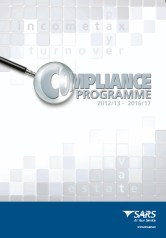 SARS has issued its inaugural SARS Compliance Programme, a high-level overview of its plans for the next five years to further grow compliance with tax and customs legislation. More so than perhaps any other time in history, the current global economic conditions have thrust domestic resource mobilisation into the spotlight, highlighting sustainability built on a foundation of tax compliance. Countries lacking this solid base have found their room for manoeuvre in these uncertain times severely curtailed and, in some cases, completely absent. The impact of self-reliance on self-determination is self-evident.
SARS has issued its inaugural SARS Compliance Programme, a high-level overview of its plans for the next five years to further grow compliance with tax and customs legislation. More so than perhaps any other time in history, the current global economic conditions have thrust domestic resource mobilisation into the spotlight, highlighting sustainability built on a foundation of tax compliance. Countries lacking this solid base have found their room for manoeuvre in these uncertain times severely curtailed and, in some cases, completely absent. The impact of self-reliance on self-determination is self-evident.
Many tax administrations publish similar compliance programmes (including Australia, Brazil, Canada, Denmark, Netherlands, New Zealand, Poland, Spain, Sweden, Turkey, USA, UK) and SARS has based it’s Compliance Programme on their ground-breaking work. To download and read the SARS Compliance Programme, click here! For Customs specialists and trade practitioners no less than 3 priority areas involve Customs –
Illicit cigarettes: the trade in and consumption of illicit cigarettes is detrimental to the fiscus and to the health of South Africans. SARS interventions will continue to focus on clamping down on cigarettes smuggled via warehouses as well the diversion of cigarettes destined for export back into the local market. SARS also plans to modernise it’s warehousing management and acquittal system.
Undervaluation of imports in the clothing and textile industry: Undervalued imports pose a significant risk not only to the fiscus but to local industry and job creation. SARS will continue to work together with other government agencies and industry stakeholders to clamp down on this practice including through the establishment and frequent revision of a reference pricing database to detect undervaluation, increasing inspections as well as supporting an integrated border management model.
Tax Practitioners and Trader Intermediaries: Regulation of this industry will be pursued to ensure that tax practitioners and trade intermediaries are all persons of good standing, are fully tax compliant in their personal capacity and provide a high quality service and advice to their clients. SARS will also develop a rigorous risk profiling system to identify high risk practitioners and trade intermediaries.
Related articles
- Durban – Harbour mafia busted! (mpoverello.com)
Hi Mike, Does this mean that SARS has a date for inclusion of domestic excise producers in the customs modernisation programme?
Liz
Hi Elizabeth, In the longer term excise producers will be included in the greater “Single Registration” programme. While excise transactional requirements still fall outside of ther CMP, there has recently been a move to equate excise declaration procedures with that of the Customs Procedure Codes. For excise these will more than likely be referred to as excise procedure codes (EPCs), Why? because the legal frameworl for excise will form part of a future Excise Control Bill. There is no reason why excise producers can not be accorded ‘preferred trader’ status – given their size and contribution to the fiscus – but bear in mind that this programme is currently operated on an ‘invitation’ basis, i.e. it is not voluntary. Mike
Thanks Mike,
That sounds like real progress! Ideally, the movements from excise producers to export should link in and the imports of products used in manufacture should also link in which must help in assessing credibility of declarations and tracking of suspect movements. Any idea how “longer term” this is likely to be, given the need to reduce excise revenue leakage?